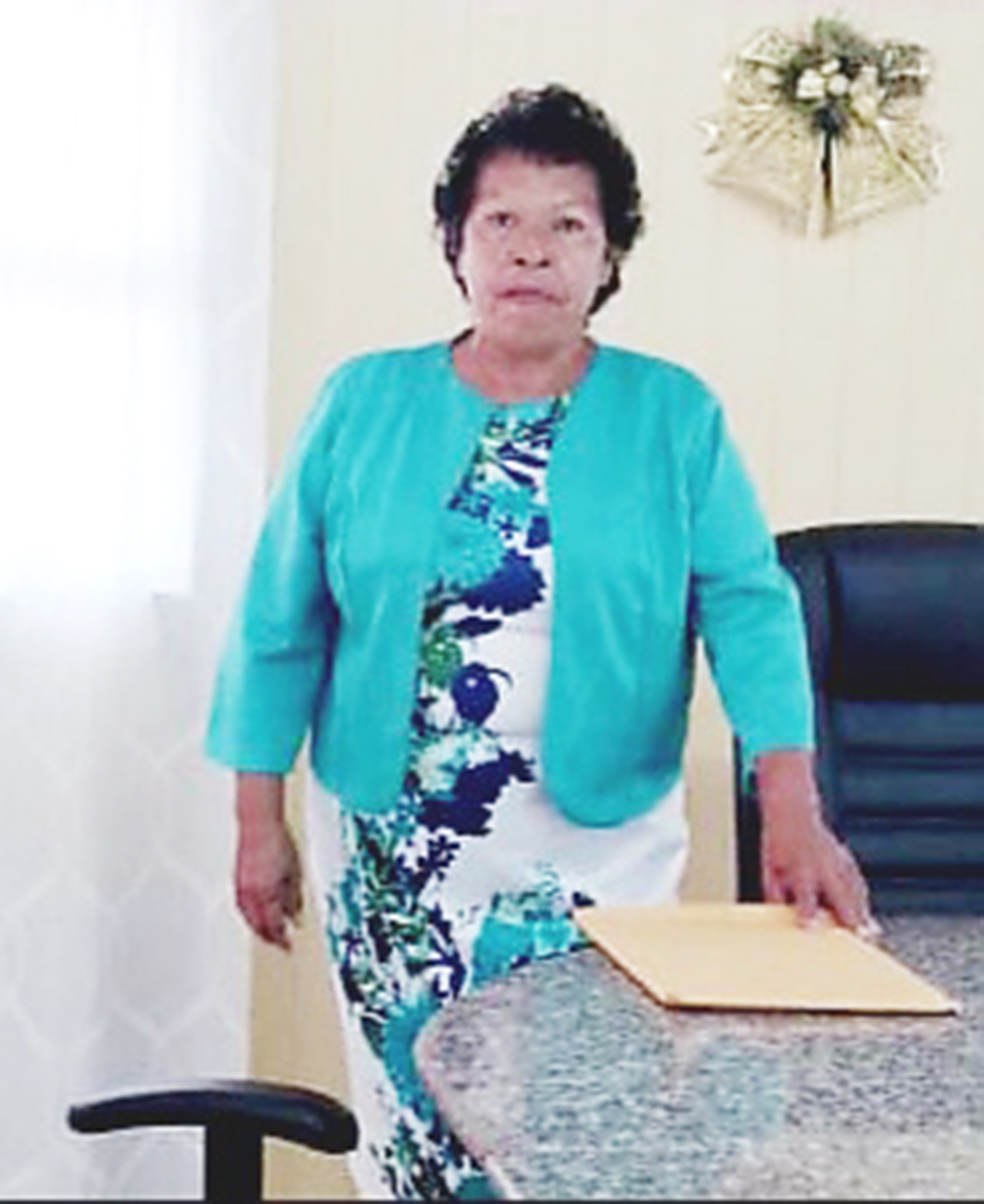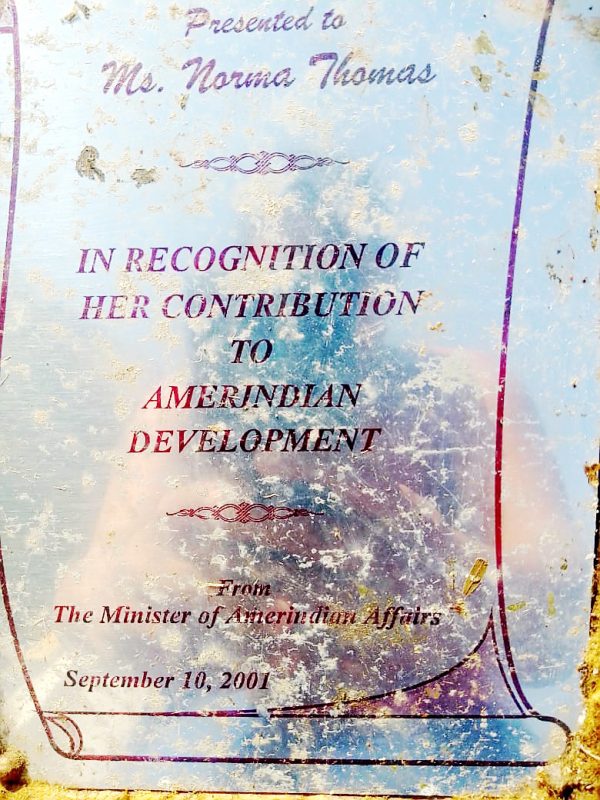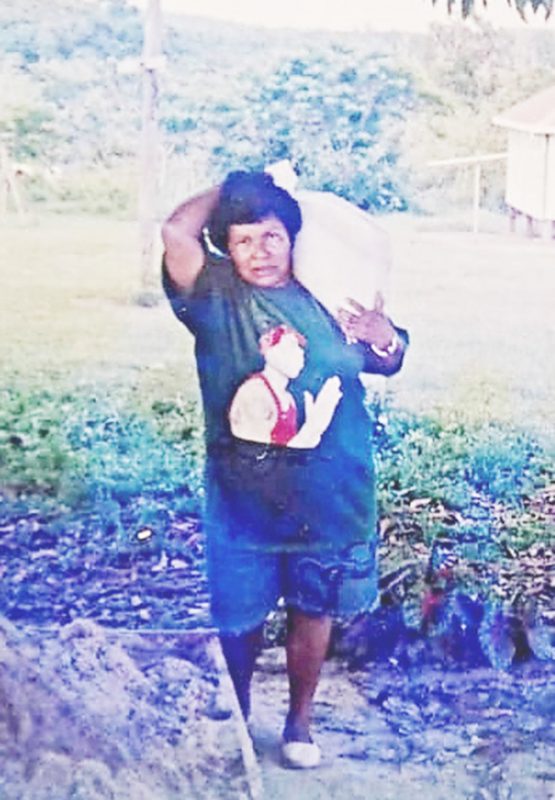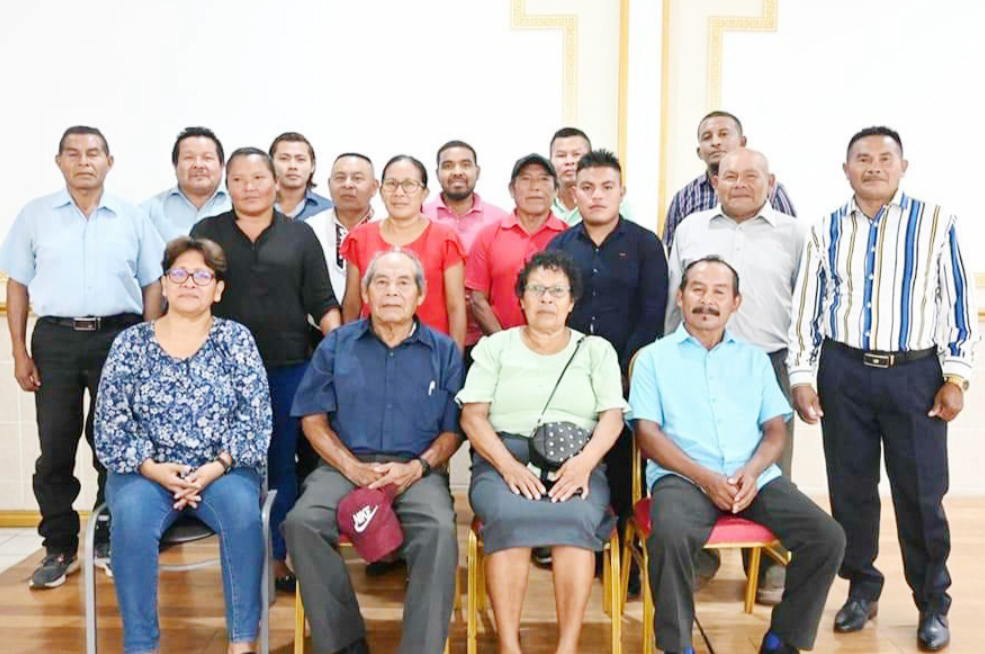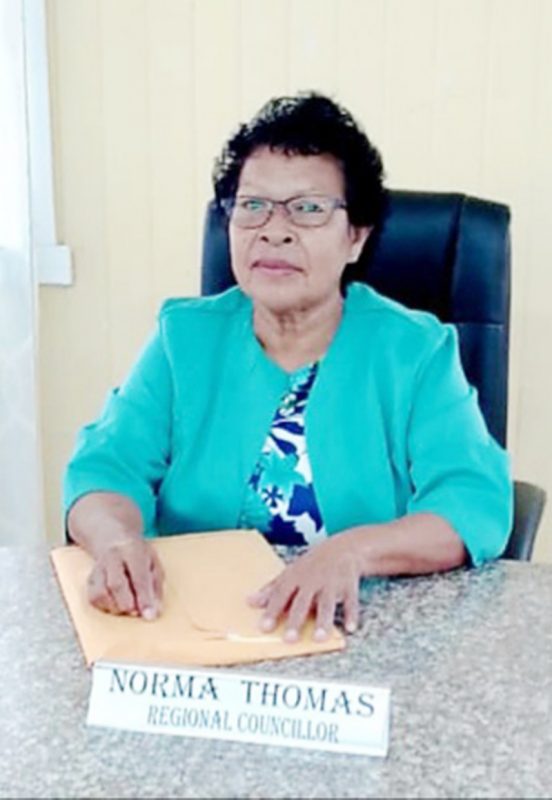By Miranda La Rose
Indigenous, political and women’s activist Norma Thomas of Kamarang, Upper Mazaruni does not believe that political affiliation should matter with regard to holding office at the village level.
“After all, managing the village council is politics by itself and villagers should be able to determine who they want as their leader, regardless of which party they support,” the 64-year-old activist told Stabroek Weekend.
Thomas first served a three-year term as toshao under the revised Amerindian Act from 2009 to 2012. She then took a break and served again from 2015 to 2018. She was eligible for reelection, but claimed she was fought down by an individual from the Amerindian Peoples Association (APA) who advocated that persons affiliated with political parties should not compete in the village elections.
“They fought me down. Then after the land case in December they invited me as one of the plaintiffs to say thank you,” she recalled. “I don’t know if councillors must not be toshaos and must not be community leaders because we are political people. There were times I withdrew from contesting for personal reasons, but here you are commending me for standing up. With the hydro dam, I fought against it because we would have lost our lands while outsiders benefit. Regardless of which political party I am in, once I know my community’s needs I will fight for my people regardless of which government is in power. I represent my people as a toshao and I am still doing so as a village councillor and regional councillor. I use my politics as a tool to achieve for our people. This talk about toshao must not be affiliated to a party is not right.”
In 1998, Thomas and five male toshaos in the Upper Mazaruni took the government to court in the Upper Mazaruni land case. The toshaos sought technical assistance including legal representation from the APA in the matter.
“On 16th December 2022, as one of the plaintiffs in the case I was there virtually for the ruling in which the judge ruled, after 24 long years, that the land belongs to the Akawaio and Arekuna. That was a historic victory for us,” she said
Thomas was on the Kamarang/Warawatta village council for some 30 years during which time she was secretary to the council for 12 years and toshao for 16 years.
She is currently assistant chief scrutineer (APNU) on the Guyana Elections Commission.
Born at Kamarang on 7th February 1958, Thomas, of Akawaio origin, is the second of five siblings. She grew up in the Seventh Day Adventist Church and was enrolled in its Pathfinders Club, a youth group. “It was through Pathfinders’ training, I learned public speaking and not being afraid to face the public,” she recalled.
Thomas started her primary education at Kamarang Primary School. When her father, a medical ranger (community health worker), was transferred to Waramadong she was transferred to Waramadong Primary.
In 1975 she was awarded a hinterland scholarship at the Government Technical Institute (GTI) to study secretarial science. “Pursuing studies in Georgetown was very hard on me at first, especially the change in environment and change in diet,” she said. “The second week in class, I had to write a composition on the topic, load-shedding. I had no idea what that was. I stared in space like a dummy. I didn’t ask the tutor what load-shedding meant in front of the class because I didn’t want to be embarrassed. Afterwards, I asked a classmate from Plaisance and she explained to me that load-shedding was just another word for blackout.”
On return to Kamarang from GTI she was offered a job at the then Ministry of National Development and stayed there until the ministry was disbanded. From 1991 to 2003 she was a typist/clerk with the district administrative office at Kamarang.
From 1983 to 1995 she served as a councillor on the village council under then toshao Albert Reid and was the secretary of the council for those 12 years.
“Under the 1976 Amerindian Act, elections were held every two years and they always elected me councillor. In 1996, I was elected the first woman toshao for Kamarang-Warawatta and I was re-elected undefeated until 2006,” she said. She is the only woman elected as toshao in the village to date.
Once she declined running for the post, but she was told that the people had confidence in her and by declining she was disappointing them. “I felt bad, withdrew the decline and since then I never declined.
I accepted elections as a challenge. There were times it was hard, especially when I was working as a typist/clerk and was toshao,” she added.
“Growing up, my father Jordan Thomas was a toshao who served Waramadong for many years so I learned a lot from him.
“I learnt by observation how to plan for community development and how to be a leader.
“I followed in my father’s footsteps. He was a regional vice chairman and then a chairman. I became regional vice chairman and followed him in becoming a toshao. After me, my sister Amrita became a vice chairman. We followed in his footsteps.”
As a member of the People’s National Congress (PNC) and recognised as a community leader she was selected to undertake a one-year programme in political science, called developers course, at Cuffy Ideological Institute on the Linden-Soesdyke Highway in the late 70s. “They offered us Spanish too, which was optional. I don’t know why I didn’t do Spanish. I always regret it,” she said.
Thomas said every activity she did in some way prepared her for leadership at the community and regional levels.
“I was a member of the APA Unit Kamarang-Warawatta. The APA held a lot of workshops.
I had a lot of training in leadership especially through the APA and I was also trained in leadership at the Women’s Leadership Institute at Cove and John. Being a councillor and a toshao, I always took advantage of training opportunities in leadership capacity offered. Those helped me a lot in understanding my own role,” she said.
Thomas also undertook training and took part in workshops on how to treat with domestic violence and child abuse. In turn she shares her knowledge. “I tell them about the penalties for father and daughter relationships. Especially in Kamarang I literally preach in my public meetings,” she said. “I warned that if they did not heed the rules, I would make someone an example. I think I have had some successes in curbing incest, but teenage pregnancy remains a problem. Because people do not know the laws and the consequences of breaking them I organised a lot of awareness programmes and did a lot of preaching.”
She added, “We try to resolve issues at the village level before taking some matters to the police. At present, a relative from Paruima is in the lock-up for getting an 11-year-old pregnant. We are working through a women’s group in the Adventist church. The three churches in Kamarang are trying. We can’t give up as parents or as mothers.”
While she has played a role in infrastructural development in her village, she said she focused a lot on sports to get the young people involved since the lack of recreation and employment has contributed to social ills including teenage pregnancy, incest and alcoholism.
“I developed the sports ground at Kamarang. That was a priority,” she noted.
She has organised training and workshops in the community with several agencies to involve women and to facilitate their training at the Women’s Leadership Institute, to empower them to engage in meaningful activities in the home and become independent.
Political activism
It was a former regional chairman, Kenneth Bancroft, who introduced Thomas to political work. “I was always a member of the PNC except for one time when I joined the Guyana Action Party (GAP) in 2000. I never had problems with my political work in Kamarang or the Upper Mazaruni as the area was considered a stronghold of the PNC,” she said.
In 2001, she contested the general and regional elections as a candidate for GAP which obtained three seats on Region Seven (Cuyuni/Mazaruni) Regional Democratic Council, the PNC Reform gained six and the People’s Progressive Party/Civic also gained six.
“Even though we had three seats, I was elected the vice chairman and held the post from 2001 to 2006. We made a big difference in the politics of the region at the time. So when the councillors of the PPP/C or the PNCR needed our support, they had to fight to convince us. We made a big difference in the decision-making process,” she stated.
At the time she joined GAP, she said the leaders of the PPP/C and the PNCR rarely visited the area so new parties were making inroads. “Even the PNC [didn’t have] time with me, though I had served them for so many years. After I became vice chairman under GAP, they realised they had lost a strong member. After Paul Hardy gone where he gone and GAP weakened, the PNC called me back and I returned. That is how I am still a member of the RDC as councillor of APNU from 2015 to now,” she said.
“As councillor I represent the people. I don’t count myself as a councillor for APNU. As councillors, we go as one head to represent the people of Region Seven. At budget time we contact all the villages. In the past most of the councillors came from the Upper Mazaruni. This time around, we failed. We only have one councillor for the Upper Mazaruni after all these years. For the first time [Lenox] Shuman’s party got one seat and that has gone to Kako.”
A secondary school plug
Thomas has noted that Upper Mazaruni district has one secondary school at Waramadong, the Desiree Caesar-Fox Secondary School, which is 18 miles by land and 25 miles by river from Kamarang. “We are crying out for secondary schools in Jawalla and Kamarang,” she said. “The aircraft lands at Kamarang and it is a matter of logistics. It has been falling on deaf ears. We put up that proposal again. Hope it will be approved in the 2023 budget for another secondary school.”
The Desiree Caesar-Fox Secondary School was built to accommodate 250 students but now accommodates more than 600 students. “Students have been doing well academically. We have our own teachers who were trained at Cyril Potter College of Education and some went to the University of Guyana and got their degrees in education,” she noted.
A secondary school at Jawalla will serve the people of Jawalla, Phillipai, Chinaweng, Wax Creek and other communities in that area.
“We suggested Kamarang because it is always a logistical challenge to transport supplies from Kamarang to Waramadong. If a school is in Kamarang it will reduce the bulk of supplies that has
to go to Waramadong and will reduce overcrowding in the dorms and the school. We have a population of students at Kamarang too,” she added.
Thomas’s five children are making their contributions to the development of the Upper Mazaruni. She is currently seeing her son through UG where he is in his final year completing a bachelor’s degree in pharmacy. “I sought a scholarship from the Public Service Ministry but I never got through. I am still working to support him through UG. My salary, NIS benefits and treasury payments all go towards his rent, internet, light bill and general upkeep in the city,” she said.
When her son was at GTI, Thomas said, then minister of Amerindian affairs Carolyn Rodrigues-Birkett assisted with a hinterland scholarship to enable him to complete his programme.
As the women’s representative on COICA (Coordinator of Indigenous Organisations of the Amazon River Basin) through the APA, Thomas travelled to meetings in Peru, Ecuador, Colombia, Bolivia and the Philippines. “What I saw when I travelled out of the country made me want to introduce community tourism at Kamarang, but I guess people were not ready for it. I still put community tourism in our budget for this year and the community has approved it.”
With a wealth of knowledge that she shares and wants to continue sharing, she said, “I am back with the Seventh Day Adventist after years of straying. I am now leader for the women’s ministry.”
In 2011, Thomas was honoured by Rodrigues-Birkett in recognition of her work in Amerindian Development. “I treasure that little plaque,” she said.
